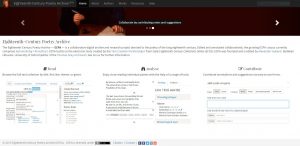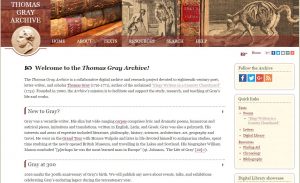
The Eighteenth-Century Poetry Archive (ECPA) is a digital project in support of the teaching, study, and research of the poetry of the long eighteenth century. It comprises a full-text collection of richly-encoded digital texts and a research project that aims to integrate texts and (digital) scholarship into a curated research collection. ECPA is based on the principle of user participation, the corpus is edited and annotated collaboratively, and will grow and evolve with the requirements and interests of its users.
ECPA was originally intended as a way of providing literary and historical context for its sister project, the Thomas Gray Archive, covering the lives and works of contemporaries of Gray’s such as William Collins, Mark Akenside, Joseph and Thomas Warton, Christopher Smart, and James Thomson. As the project evolved and widened in scope, its initial contextual focus shifted to an analytical one.
ECPA builds on the texts created by the Text Creation Partnership (TCP) from Eighteenth Century Collections Online (ECCO). The transcription and encoding has been enriched with additional descriptive (e.g., author attributions on poem level) and analytical markup (e.g., recording verse, stanza, and poem form, assigning of themes and genres, assigning rhyme scheme, assigning metrical pattern, recording of syllable pattern, addition of explanatory/editorial annotations) in support of a computationally assisted close reading process.
As readers engage with texts in different ways and with different objectives, we have modeled these different types of user engagement into distinctive “views” of the text. So far, we have focused on views that support a first reading of a text (“reading” view) and the initial analysis of a text (“analysis” view) in the form of a close reading. Over time, the ECPA research project will enable new modes of engagement and allow for increasingly sophisticated ways of interacting with the texts.
ECPA is currently available in public beta and is in active development. Current developments are concerned with increasing the number of poets and poems represented, and exploring the possibility of including other European languages. We welcome any feedback about issues, feature requests, or general feedback about the content, functionalities, or design of the Website. Please e-mail <[email protected]>.

